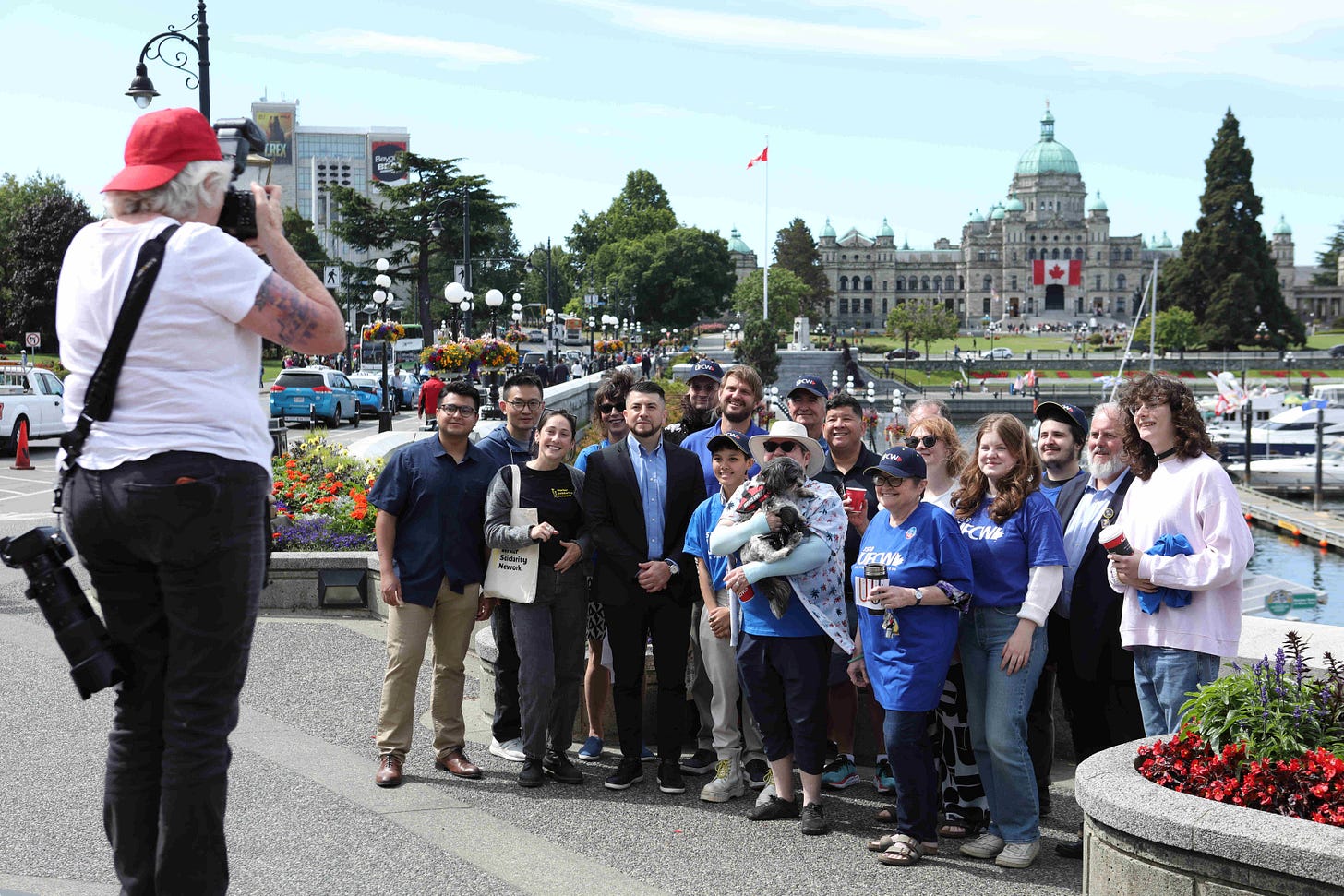Victoria Uber Drivers Unionize In Historic First
An almost year-long organizing drive pays off. What does it mean, and what happens next?
This article can also be viewed here on the Socialist Alternative Canada website, for which it was originally written.
A small group of Uber drivers, union officials and organizers gathered in Victoria’s inner harbour on the morning of Thursday July 3rd, 2025, to drink coffee, pose for pictures, and celebrate the first-ever union certification of gig workers in Canada.
The historic moment for the labour movement brings over 500 individual drivers into one, much more powerful bargaining unit represented by the United Food and Commercial Workers Union (UFCW) Local 1518. The drivers will now be electing a bargaining committee that will enter into negotiations with Uber to secure a contract, which would be the first of its kind.

“I think there’s ramification globally of what this means,” UFCW Canada's director for emerging sectors, Pablo Godoy, told me. “It’s the first time that [Uber] drivers or app-based workers that we know of will be able to sit at the table and actually negotiate with the company they work for.”
Especially since the Covid pandemic, workers are increasingly taking jobs that pay per “gig” and do not include a wage or salary. These gig workers are often not considered employees and are thus denied the benefits and protections that employees are entitled to, like a guaranteed minimum wage, employment insurance, overtime, parental leave, or termination pay. The exploitation of gig workers is a key component of Uber’s business model, just as it is with other gig employers like Lyft and Amazon.
A report published in 2024 by Ridefair Toronto and the Rideshare Drivers Association of Ontario found that Uber drivers in Toronto can make as little as $6.37 per hour – well below minimum wage.
To protect their ability to continue exploiting gig workers, these employers have fought tooth and nail against unionization efforts. When all else fails, they sometimes flee rather than risk giving back any amount of their immense profits to the people who earn it for them. When Amazon workers unionized in Quebec earlier this year, the company shut down all seven of its warehouses in the province (for completely unrelated reasons, of course). After Ontario gig workers employed by food delivery company Foodora won the right to unionize in 2020, that company (again, coincidentally) fled the country.
The July 11th union certification of Amazon employees at a warehouse in Delta, BC – another huge recent BC labour victory – happened despite the company’s union-busting efforts (actually, it happened in part because of these efforts), and Amazon has signalled that it plans to contest the certification.
But Uber seems resigned to negotiating as the price of continuing to operate in Victoria, stating that it “will be sitting down with UFCW 1518 to discuss the issues raised by drivers."
Why were Victoria drivers the first?
UFCW has spent years trying to unionize Uber drivers in Canada. But Godoy credited the workers, not the union, for the victory in Victoria.
“What happened here was that driver decided among themselves that they wanted to organize,” he told me. “They started meeting and talking with each other, and they have a lot of chat groups on different platforms that they communicate on. That was integral to the organizing drive.”
Godoy said the drivers want a say in how the Uber app works and increased transparency regarding the customer rating system and the account deactivations they can be hit with if their ratings are too low.

The Victoria drivers’ success, it must be said, was also greatly assisted by the BC NDP, which re-introduced a single-step union certification law in 2022, making it easier for BC workers to unionize (the BC NDP has instituted single-step certification three times, and conservative governments have twice undone it). It also recognized app-based workers as employees in 2023, granting them some of the protections afforded by the province’s Employment Standards Act.
Even with these advantages, it took the Victoria drivers almost a year to achieve union certification. A major challenge was proving that the requirement to have 55% of the workers sign union cards had been met, since the number of Uber drivers in the city is constantly in flux. In the end, over 500 of the approximately 600-700 drivers signed union cards in Victoria, convincing the BC labour board that the 55% threshold had been surpassed.
Drivers in other provinces, unfortunately, may find it difficult to follow in the Victoria drivers’ tread marks. Uber drivers in conservative-governed Ontario, for example, are not considered employees, and would have to navigate a two-step union certification process. So while the victory in Victoria is historic it remains to be seen how for beyond BC its ripple effect will travel.
This points to the need for the wider labour movement to pull together to create conditions amenable to the unionization of gig workers across the country.
Joys and perils of unions
The drivers I spoke to were jubilant about the union certification. Toby Stewart, a bus driver who started driving for Uber part time almost a year ago, told me that he enjoys the freedom that driving for Uber affords him, since he can work at any time of day and is in control of his hours. “It’s been a great experience,” he said; now that it’s a union job, “it’s even better.”
“It’s nice having that protection,” he added.
Stewart said he hoped to see better pay from the drivers’ first contract. He said as things stand now, he makes about $38 from a $60 trip from downtown to the ferry terminal, which is an 80-90 minute round trip. That has to cover gas, vehicle depreciation, and down time between trips.
Another driver told me she was still working to pay off the new car she had been required to buy to work for Uber, which requires drivers to operate cars that are no more than 9 years old.
But the Victoria drivers are also well aware that their fight for workplace justice is far from over. In fact, getting union certification, Stewart said, was “the easy part.”
For one thing, Uber is sure to be difficult to bargain with. For another, workers must always be on guard against union officials who prioritize their own careers over worker rights, or who are under the illusion that the interests of workers and those of the bosses can be reconciled.
Such “business unionism” was on full display in 2022, when UFCW leadership pulled the rug out from under the Uber drivers organizing in Toronto, agreeing to a settlement that Uber hailed as “historic” but critics called “a half-measure [that] could prevent full unionization and counter the efforts to reclassify Uber workers as employees.”
Shortly thereafter an investigation by The Globe and Mail revealed that UFCW had actually colluded with the company to prevent Ontario drivers from being legally recognized as employees by the Province.
These betrayals underscore the need for rank-and-file workers to fight for their rights even within unions: to vote for socialist representatives who understand that the bosses cannot be reasoned with because their very existence is premised on the exploitation and oppression working people, and who take no more that the average wage of a skilled worker; and to push for the right to recall union officials who prioritize their careers.
Unionization, in other words, is not the finish line but step one. Unions are a means to fight back against the bosses; a sword that must be kept sharp and which can never, by itself, guarantee victory.
Despite the challenges ahead, the drivers I spoke to in Victoria are optimistic about their future with UFCW. When I asked Stewart if he had any advice for other app-based workers in BC, he urged them to organize and take advantage of the single-step certification process to unionize their workplaces.
“I just think, go out there, take the opportunity to ask different unions if they will accept you,” he said.







Excellent article! Such exciting news. Best of luck to those workers through negotiations ✊
-ang & grace